专四虚拟语气题目及讲解
虚拟语气讲解和练习(附答案)
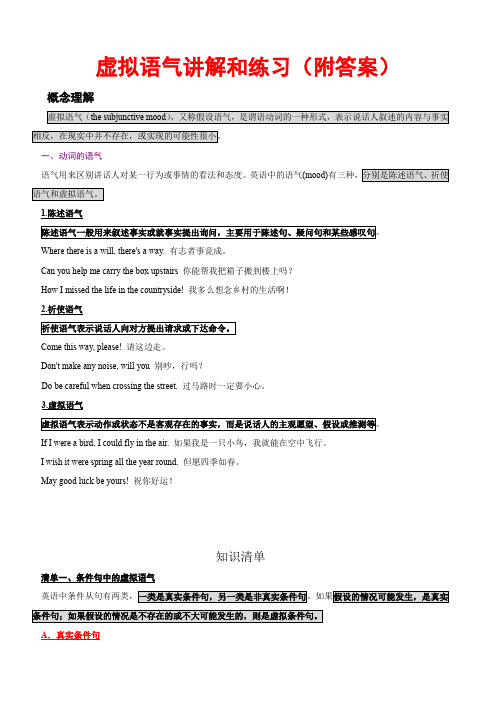
虚拟语气讲解和练习(附答案)概念理解一、动词的语气语气用来区别讲话人对某一行为或事情的看法和态度。
英语中的语气(mood)1.陈述语气Where there is a will, there's a way. 有志者事竟成。
Can you help me carry the box upstairs 你能帮我把箱子搬到楼上吗?How I missed the life in the countryside! 我多么想念乡村的生活啊!2.祈使语气Come this way, please! 请这边走。
Don't make any noise, will you 别吵,行吗?Do be careful when crossing the street. 过马路时一定要小心。
3.虚拟语气If I were a bird, I could fly in the air. 如果我是一只小鸟,我就能在空中飞行。
I wish it were spring all the year round. 但愿四季如春。
May good luck be yours! 祝你好运!知识清单清单一、条件句中的虚拟语气A.真实条件句If he doesn't come at 8, we won't wait for him. 如果他八点不来,我们就不等他了。
If a flood happened in the past, there was usually a great loss of life and property. 过去发生洪水的话,常有很大的生命和财产损失。
We shall go there unless it rains tomorrow. 如果明天不下雨,我们将去那里。
I'll let you use my bike on condition that you keep it clean. 如果你能保持车子干净,我就让你用我的自行车。
专四语法重点题详解,虚拟语气
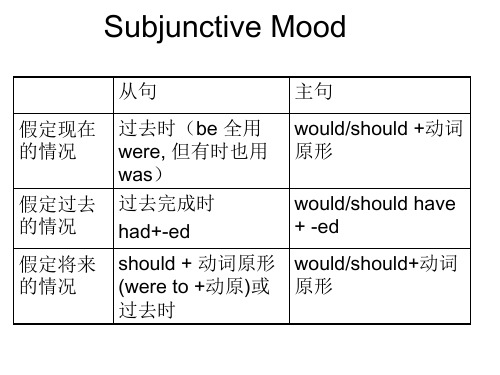
• If only the patient ______ a different treatment instead of using the antibiotics, he might still be alive now.(2007) • A. had received • B. received • C. should receive • D. were receiving • A
• _____, he would not have recovered so quickly. (1995) ) • A. Hadn’t he been taken good care of B. Had he not been taken good care of • C. Had not he been taken good care of D. Had he been not taken good care of • B
Examples
• The rapid change of society requires that college students adapt to the world outside campus by getting to know the society. • I would rather that you did nothing for the time being. • I wish that I were a student again. • I wished that I had followed his suggestion.
•
If you have really been studying English for so long, it’s about time you _____ able to write letters in English. (1999) A. should be B. were C. must be D. are B,it’s about time that sb. did sth. ,
专四语法(虚拟语气)
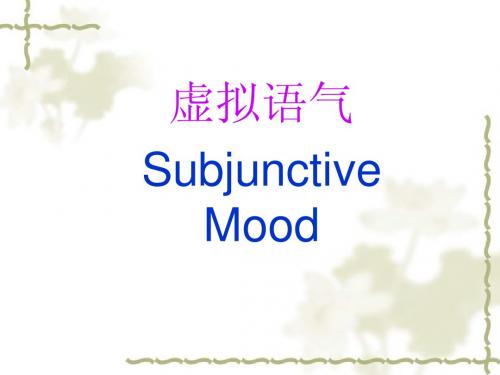
4) it is time (that), it is high time
(that)句型中 谓语动词用过去时, 句型中, (that) 句型中 , 谓语动词用过去时 , 或者 should+动词原形 此时的should 动词原形, should不能省 是should+动词原形,此时的should不能省 略,表示早该做而未做的事,意思是 ……了 早该…… ……了 “该……了、早该……了” It‘s already 5 o’clock now.Don‘t you think it’s about time we went home? It’s time you should do cleaning.
if, though引导的从句 5)以as if,as though引导的从句 as though (as if),意为“好像、仿佛”。as though/as if都可以引导方式状语从句或表词从 句,在连系动词之后引导表词从句,在行为动 词之后引导方式状语从句。as if/as though引导 的从句既可用陈述语气又可用虚拟语气。如果 说话者认为句子所述的是事实或是或极有可能 发生的事实时,则从句用陈述语气;如果表示 的事情发生的可能性不大或非真实的情况,则 从句用虚拟语气。动词形式和wish后面的从句 动词形式变化相同。
3)would rather + 句子(过去时) 句子(过去时) 表示“ 宁愿、 宁可” 语气比较委婉, 表示 “ 宁愿 、 宁可 ” , 语气比较委婉 , 后接过去 式。 ---I am too busy these days. I would rather all of you ______ next month for a dinner. A. come B. would C. came D. have come ---It is getting late. I’d rather you ____now. (2011.61) A. left B. leave C. are leaving D. will leave
英语四级高级语法讲解:虚拟语气

英语四级高级语法讲解:虚拟语气虚拟语气是说话者用来表示假设,或难以实现的情况,而非客观存在的事实,所陈述的是一个条件,不一定是事实,甚至完全与事实相反。
下面是作者整理的英语四级高级语法讲解:虚拟语气,欢迎大家阅读学习。
引导的虚拟语气2.倒装形式Were I you(=if I were you),I would get up early in the morning.Had you arrived at the station ten minutes earlier yesterday(=If you had arrived…),you could have caught the train.Should it rain(=If it should rain),the crops would be saved.It is time that ...Would rather that.....(1)I would rather he came tomorrow than today.(2)John would rather that she had not gone to the party yesterday evening.(3)I would rather everything hadn t happened in the past.“It is(was)+形容词(或过去分词)+that……”结构中的虚拟语气is necessary that we(should 可省略,下同)have a walk now.was necessary that we(should) make everything ready ahead of time.is required that nobody(should) smoke here.is important that every pupil(should) be able to understand the rule of school.练习’ll be busy this he ___ free,he ___ to the cinema with you.to be; might go going to be; will gobe; might have gone ; will goEdison died,it was proposed that the American people _____ all power in their homes,streets,and factories for several minutes in honor of this great man.off offturn off turned offI known her name,_____.does she know mine? where does she live?would have invited her to lunch would be beautiful’d rather you ______ by train,because I cant bear the idea of your being in an airplane in such bad weather.go gogonevictim ________(本来会有机会活下来) if he had been taken to hospital in time.would have a chance to survive(翻译)professor required that ________(我们交研究报告)。
专四语法讲解(虚拟语气)

1.主从句谓语动词的时态
(1)掌握主从句谓语动词的规范搭配:
主 句 与现在事实相反 would/情态动词 过去式+do 与过去事实相反 would/情态动词 过去式+have done 与将来事实相反 would/情态动词 过去式+do 从 句 were (不分人 称)/did
had done
真题举例:
1. He would have finished his college education, but he _____ to quit and find a job to support his family. (07, 60) A. had had B. has C. had D. would have [C] 2. _____ you ____ further problems with your printer, contact your dealer for advice. (05, 63) A. If, had B. Have, had C. Should, have D. In case, had [C]
真题举例:
1. It is absolutely essential that William ____ his study in spite of some learning difficulties.(07,65) A. will continue B. continued C. continue D. continues [C] 2. It is imperative that the government _____ more investment into the shipbuilding industry.(06.59) A. attracts B. shall attract C. attract D. has to attract [C]
专四语法第13节-虚拟语气

第十三节虚拟语气虚拟语气是谓语动词的一种特殊形式,用来表达假设、主观愿望、猜测、建议、可能或纯粹的空想等非真实情况。
一if非真实条件句中的虚拟语气1.if非真实条件句的基本用法由if引导的非真实条件句表示对现在、过去、将来的事实进行假设时,主句与从句中谓语动词的形式可以分为以下三类:The victim would have had a chance to survive if he had been taken to hospital in time.遇难者如果及时送往医院,他本来就有机会活下来的。
(与过去事实相反)If I knew his telephone number,I would tell you.如果我知道他的电话号码,我会告诉你。
(与现在事实相反)If there should be a heavy snow next Sunday,we would not go skating.如果下周日下大雪的话,我们就不去滑冰了。
(表将来)[专四真题] If there were no subjunctive mood, English ______ much easier to learn. could have been B. would be C. will be D. would have been译文:如果没有虚拟语气,英语学习起来就会更容易了。
分析:本题表示与现在事实相反的假设。
表现与现在事实相反,条件从句用一般过去时,主句使用should(would)+动词原形,故B为答案。
A项could have been 是对过去事实的假设,与从句所表示的现在事实不吻合;C项will be 不可以用于虚拟语气中;D 是与过去事实相反的假设的虚拟语气从句形式。
2.省略if的虚拟条件句的用法在虚拟条件句中,如果从句中含有were, had或should等词时,可将if省去,把were, had或should等提到主句之前,引起倒装。
4级翻译虚拟语气讲解精选+习题
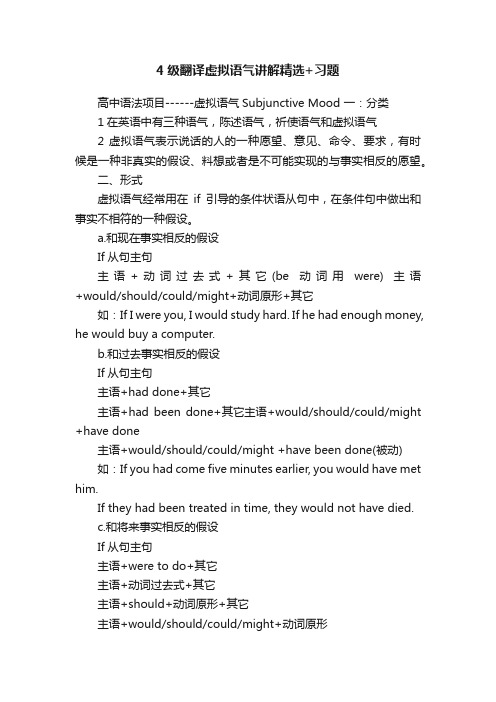
4级翻译虚拟语气讲解精选+习题高中语法项目------虚拟语气Subjunctive Mood 一:分类1在英语中有三种语气,陈述语气,祈使语气和虚拟语气2 虚拟语气表示说话的人的一种愿望、意见、命令、要求,有时候是一种非真实的假设、料想或者是不可能实现的与事实相反的愿望。
二、形式虚拟语气经常用在if引导的条件状语从句中,在条件句中做出和事实不相符的一种假设。
a.和现在事实相反的假设If从句主句主语+动词过去式+其它(be动词用were) 主语+would/should/could/might+动词原形+其它如:If I were you, I would study hard. If he had enough money, he would buy a computer.b.和过去事实相反的假设If从句主句主语+had done+其它主语+had been done+其它主语+would/should/could/might +have done主语+would/should/could/might +have been done(被动)如:If you had come five minutes earlier, you would have met him.If they had been treated in time, they would not have died.c.和将来事实相反的假设If从句主句主语+were to do+其它主语+动词过去式+其它主语+should+动词原形+其它主语+would/should/could/might+动词原形如:If I were to do it, I would do it in another day.If it rained tomorrow, we wouldn’t be able to go on picnic.d.混合条件句混合条件句是指条件句是对过去事实相反的假设,而主句则表示现在的某种情况。
专业英语四级(从句与虚拟语气)模拟试卷3(题后含答案及解析)
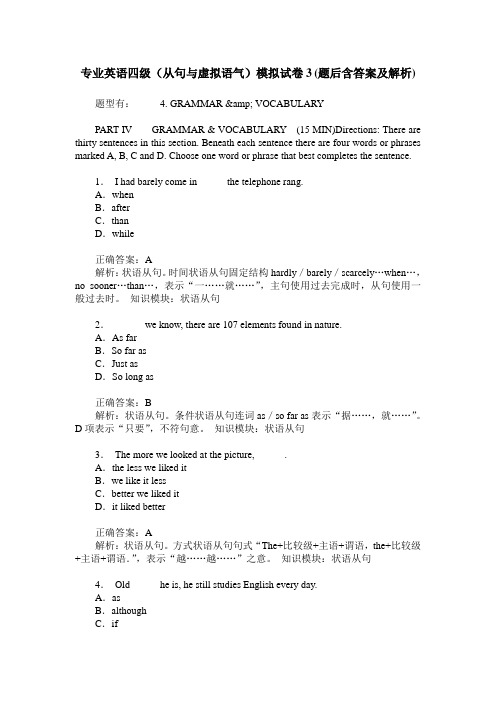
专业英语四级(从句与虚拟语气)模拟试卷3(题后含答案及解析) 题型有: 4. GRAMMAR & VOCABULARYPART IV GRAMMAR & VOCABULARY (15 MIN)Directions: There are thirty sentences in this section. Beneath each sentence there are four words or phrases marked A, B, C and D. Choose one word or phrase that best completes the sentence.1.I had barely come in______the telephone rang.A.whenB.afterC.thanD.while正确答案:A解析:状语从句。
时间状语从句固定结构hardly/barely/scarcely…when…,no sooner…than…,表示“一……就……”,主句使用过去完成时,从句使用一般过去时。
知识模块:状语从句2.______we know, there are 107 elements found in nature.A.As farB.So far asC.Just asD.So long as正确答案:B解析:状语从句。
条件状语从句连词as/so far as表示“据……,就……”。
D项表示“只要”,不符句意。
知识模块:状语从句3.The more we looked at the picture,______.A.the less we liked itB.we like it lessC.better we liked itD.it liked better正确答案:A解析:状语从句。
方式状语从句句式“The+比较级+主语+谓语,the+比较级+主语+谓语.”,表示“越……越……”之意。
- 1、下载文档前请自行甄别文档内容的完整性,平台不提供额外的编辑、内容补充、找答案等附加服务。
- 2、"仅部分预览"的文档,不可在线预览部分如存在完整性等问题,可反馈申请退款(可完整预览的文档不适用该条件!)。
- 3、如文档侵犯您的权益,请联系客服反馈,我们会尽快为您处理(人工客服工作时间:9:00-18:30)。
(3)下列名词接同位语从句或表语从句时,从句中动词用虚 拟形式: insistence, preference, recommendation, suggestion, proposal, motion, desire, requirement, request, order, necessity, importance, regulation, rule, resolution, understanding。如: John Wagner’s most enduring contribution to the study of Afro-American poetry is his insistence that it be analyzed in a religious, as well as worldly, frame of reference. They keep telling us it is of utmost importance that our representative be sent to the conference on schedule
2.It is necessary that he __ the assignment without delay A. hand in B. hands in C. must hand in D. has to hand in
考查的是虚拟语气。“It + be +a. +that ”从句,that引导的 主语从句谓语动词常用should +动词原形。用于该句型的形 容词有necessary, good, important, right, wrong, better, natural, proper, funny, strange, surprising等。
(2)区分主从句表示的不同时间概念: 主从句谓语动词所指时间不同,这叫做错综时 间条件句,动词形式应根据实际情况来调整。如: Had it not been for the timely investment from the general public, our company would not be so thriving as it is. (主句与现在事实相反,从句与过去事实相反) Had Paul received six more votes in the last election, he would be our chairman now. (主句与现在事实相反,从句与过去事实相反)
9.__ if I had arrived yesterday without letting you know beforehand A. would you be surprised B. Were you surprised C. Had you been surprised D. Would you have been surprised
虚拟语气 1.主从句谓语动词的时态 (1)掌握主从句谓语动词的规范搭配:
主句
从句Biblioteka 与现在事实相反 would/情态动词 were (不分人 过去式+do 称)/did 与过去事实相反 would/情态动词 had done 过去式+have done 与将来事实相反 would/情态动词 should do / were to do 过去式+do
(2)下列形容词和分词做表语或补语时,that主语从 句中动词用虚拟形式: advisable, desirable, insistent, preferable, urgent, appropriate, compulsory, crucial, essential, imperative, important, necessary, obligatory, possible, probable, proper, vital, advised, arranged, commanded, demanded, desired, ordered, proposed, recommended, requested, required, suggested。如: The board deem it urgent that these files should be printed right away. It is essential that all these figures be checked twice.
7. It’s high time we __ cutting down the rainforests. A. stopped B. had to stop C. shall stop D. stop
It’s (high) time (that) 后面的从句谓语动词 用一般过去式或should +动词原形,且 should 不可省略。
虚拟语气
回顾历年真题 虚拟语气讲解
1、It’s getting late. I’d rather you
__now. A、left B、leave C、are leaving D、will leave
Would rather后面接从句时,表示主语宁愿某人做某事, 从句用虚拟语气,动词用一般过去式,表示希望。注意 区分would rather 其它两个惯用句式:would rather do sth. “宁愿做某事”;would rather do…than do…“宁愿做某事而不愿做某事”
3.含蓄虚拟条件句的谓语动词形式 含蓄虚拟语气是指假设条件不通过if从句表达,而是暗含在 其他结构中。考生应熟悉: (1)连词but, but that, or, or else;副词otherwise, unfortunately等表示转折假设。如: A safety analysis would have identified the target as a potential danger. Unfortunately, it was never done. Victor obviously doesn’t know what’s happened; otherwise he wouldn’t have made such a stupid remark. (2)介词短语暗含假设条件,常用的有:without, but for, under more favorable conditions等。如: But for the English examination I would have gone to the concert last Sunday. (3)intended/meant/hoped/wished/planned或was/were + 不定式完成式或had intended/meant/planned/hoped/wished +不定式一般式暗示虚拟语气。如:I intended to have called on you, but I was busy at that time.
3、If there were no subjunctive mood ,English__ much easier to learn. A、could have seen B、would be C、will be D、would have been
本体表示与现在事实相反的假设。表示与现在事实 相反,条件从句用一般过去式,主句使用should (would) + 动词原形。A项 could have been 是对 过去事实的假设、与从句所表示的现在事实不符合; C项 wil 不用于虚拟语气中;D项是与过去事实相反 的假设的虚拟语气从句形式。
A. Had it not been B. Hadn’t it been C. Was it not D. Were it not
might have passed,说明本句内容与过去事实相 反,所以从句应该使用过去完成时。Had it not been for 用于虚拟语气也表示要不是,要是没有, 是if it were not for 的倒装形式,但主句内容应 与现在或将来事实相反,如:Were it not for him, you wouldn’t get anywhere.
if only 常常用来表达强烈的愿望或遗憾,主要用 在虚拟语气中。由于所提事实与过去事实相反, 所以用过去完成时。
6. If only I __ play the guitar as well as you!
A. would B. could C. should D. might
考察虚拟语气中情态动词的用法。If only从意义和语法上都 相当于I wish,后面的谓语动词用一般过去时表示目前的愿 望,用过去完成时表示过去的愿望,用would/could do 表 示将来的期望。A项侧重人的意愿,B项指人的能力。
4.Had Judy been more careful on the maths exam , she __ much better results now. A. Would be getting B. could have got C. must get D. Would get
条件句与过去事实相反,虽然主句的时间副词为 now,但事实上该成绩已经出来,故用could have got. 而不是 would get.
错综非真实条件句。在通常情况下,非真实条件 句如果使用的过去完成式,主句通常用would+ 动词的过去完成式,表示对与过去事实相反的情 况的遐想。但在这句里,主从句用在了直接疑问 句里,是说话者的现场提问,显然是询问被疑问 者的当时感受,因此,采用would+动词现在时态。
10. __ for the fact that she broke her leg , she might have passed the exam.
(3)识别事实和假设混合句: Your math instructor would have been happy to give you a make-up examination had you gone and explained that your parents were ill at the time. (句子前半部分为假设情况,而“父母病了”是事 实) I would have gone to visit him in the hospital had it been at all possible, but I was fully occupied the whole of last week.
